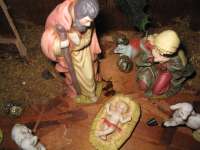The origin of Christmas?
 |
I was wondering if I should write again about Christmas myths this year. Last year I wrote about the legend of the candy cane. In 2003 it was 7 Things you might not have known about Christmas…. So what’s left?
First, I want to backtrack slightly on the 2003 post. I wrote about how that night in Bethlehem was probably not all that silent. Ok, I know I’m probably right on that one. But perhaps now that I have a couple of young kids I get the point – these songs are supposed to be lullabies to Jesus. I mean, seriously – the most popular lullaby of all, Away in A Manger, wouldn’t be a lullaby at all if it said,“The cattle are lowing, The baby awakes, and screams his small head off, what a fuss the guy makes!”
So let’s cut the song writers a little slack. They really did know what they were doing. 🙂
No, this year I wanted to write very briefly on the origins of Christmas debate. Briefly because others have done a good job writing on this one.
There are really two questions. First, is Jesus the reason for the season? Second, does it matter?
I had always heard that Christmas had its roots in pagan customs. As people became Christians, they infused the holidays with new meaning, leaving behind their pagan beliefs. In other words, Jesus is not the reason for the season. We find ourselves in a similar situation, in a culture that has in many ways abandoned all religious celebration for Santa and shopping.
Obviously, there are dangers in “adapting” pagan customs – you’re liable to mix Christian and pagan beliefs together, and that doesn’t make good egg nog. Then again, it’s natural that new Christians would find ways of worshipping in their hearts as they got together with family that was celebrating for a different reason. And Christianity is not a reason to abandon everything you did before you met Christ. There are many things in life that can be redeemed in the light of the truth. Jesus Himself came in the form of sinful flesh (Rom 8:3), the Bible says – becoming a man He redeemed humanity.
Besides, these pagan beliefs are generally not associated with the holiday anymore. I never had a problem with Christmas, as long as for me and my family it’s a time to worship. Of course, Easter should also be important to us. But when you think of how much celebration and emphasis is put on Christ’s incarnation in Scripture, I think it’s perfectly appropriate to celebrate at this time of year.
All that is very well, but doubt is being cast on the whole theory that Christmas had its origins in a pagan holiday (these would be the holidays that are clustered around the winter solstice, probably since the beginning of time, but specifically Roman and Greek celebrations of Jesus’ day). So where did Christmas come from?
The other point of view is this. Christmas was not a “Christian alternative” to a pagan holiday. Instead, the pagan holiday was an alternative to the Christian celebration!
Though the exact day of Jesus’ birth isn’t known, some early Christians believed that many prophets died on the anniversary of their birth or conception. By fixing the date of Jesus’ death, and so guessing the date of His conception, they worked back 9 months and came to – you guessed it – December 25th. Later, a pagan Roman emperor instituted a pagan holiday to try to strengthen traditional Roman beliefs at a time when his government was in trouble.
John Chrysostom, the patriarch of Constantinople (300s AD), wrote that the early church considered December 25th Jesus’ birthday. Also, using the information we have about Elizabeth and Mary’s visit in Luke and traditions about the priesthood, John calculated that it was likely that Jesus was born around this time of year.
 |
Though we don’t have evidence of Christmas celebrations much before the early 300s, there does seem to be reason to believe that Christians long before that observed Christmas in some sense.
So, in light of the fact that the birth of Jesus is considered an important reason for celebration in Scripture
In light of the fact that angels celebrated and magi gave gifts (likely quite a while after Jesus’ birth, but still related)
In light of the fact that Christians have celebrated Christmas throughout the last 2000 years
– – – Merry Christmas!
It’s up to us to have pure hearts and to celebrate Jesus’ birth for the right reasons, and to use this time to show the world the love that Jesus brings, and the transformation the Spirit makes in the lives of His disciples. May we be transformed this Christmas, and may we clearly communicate His Truth in the coming year!
Thanks to JollyBlogger for his thought-provoking post, The Ol’ Origins of Christmas Debate.
